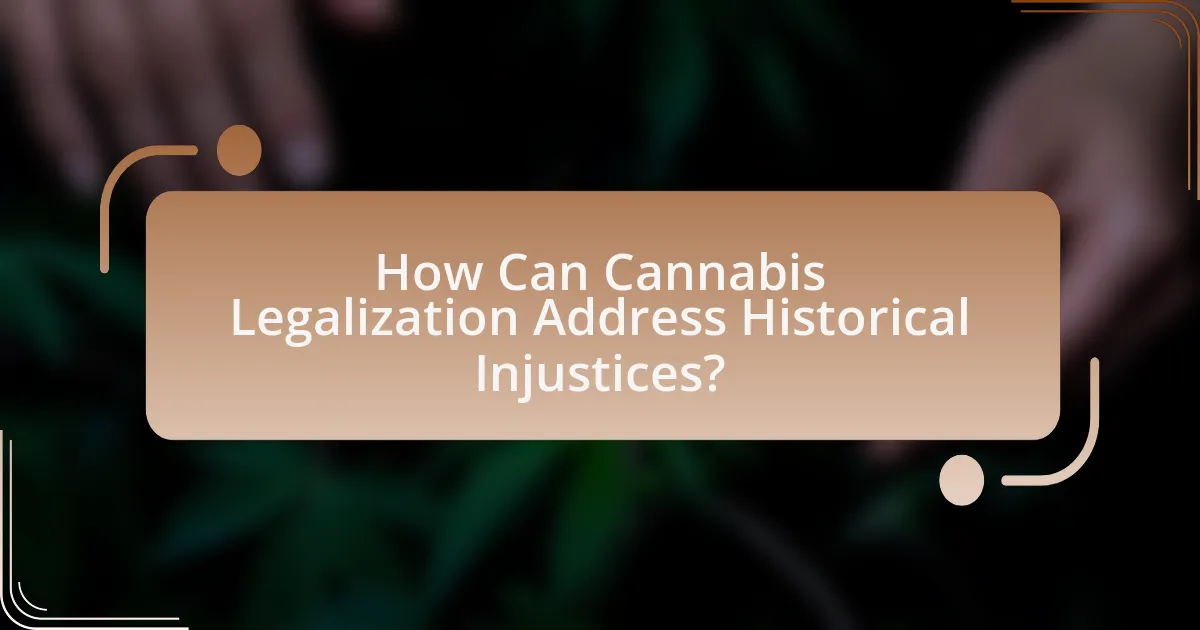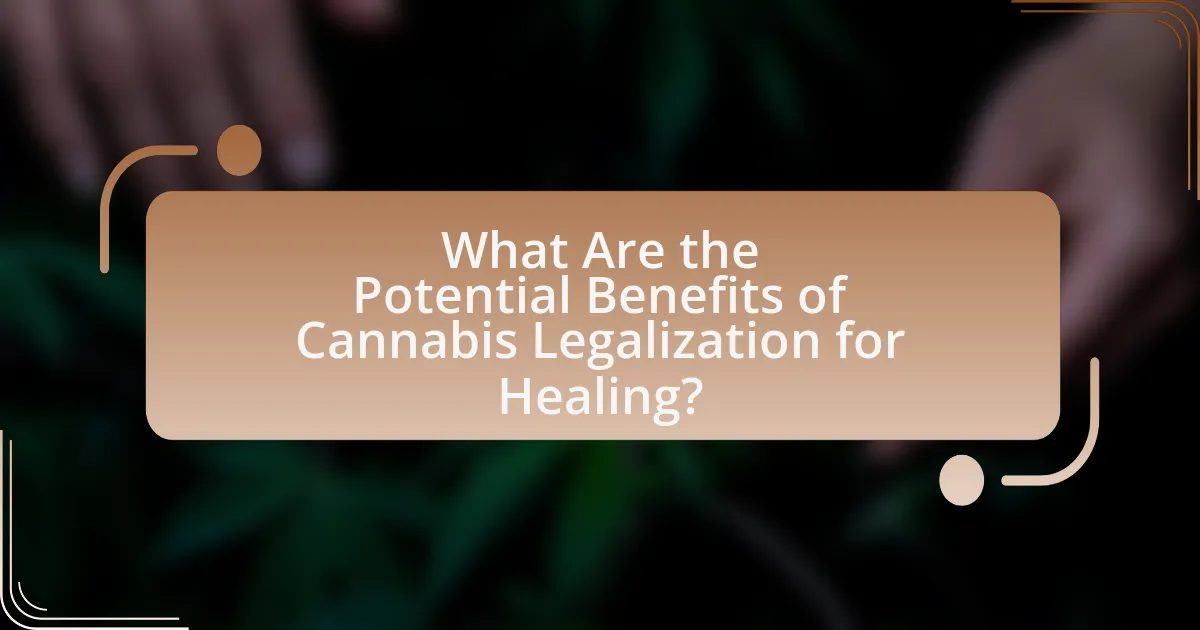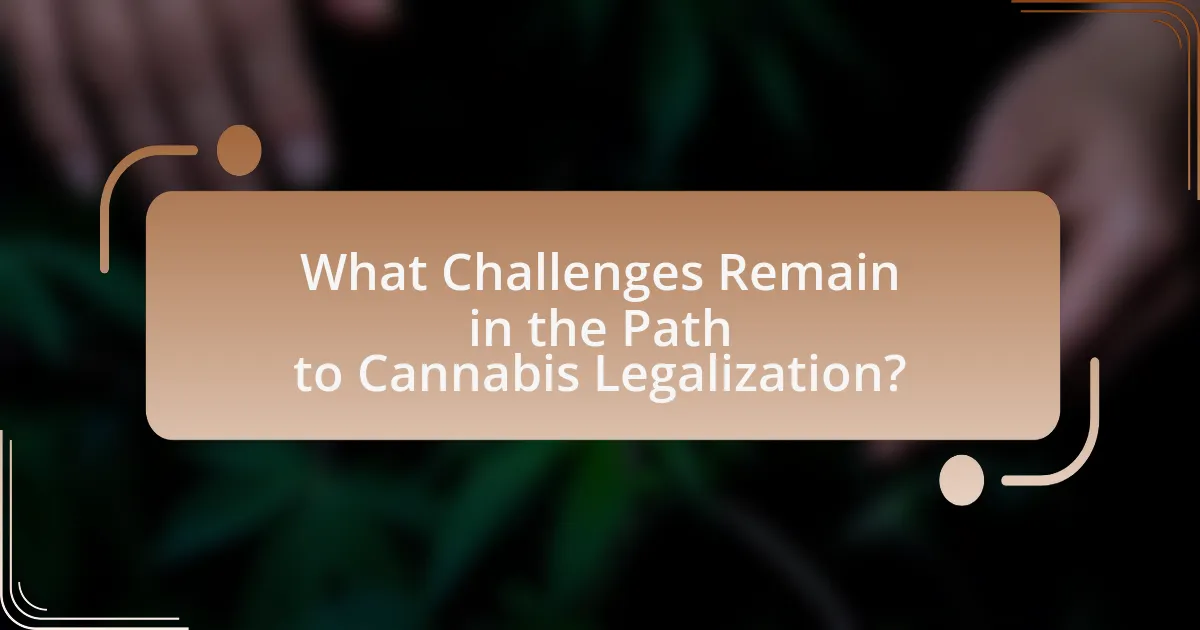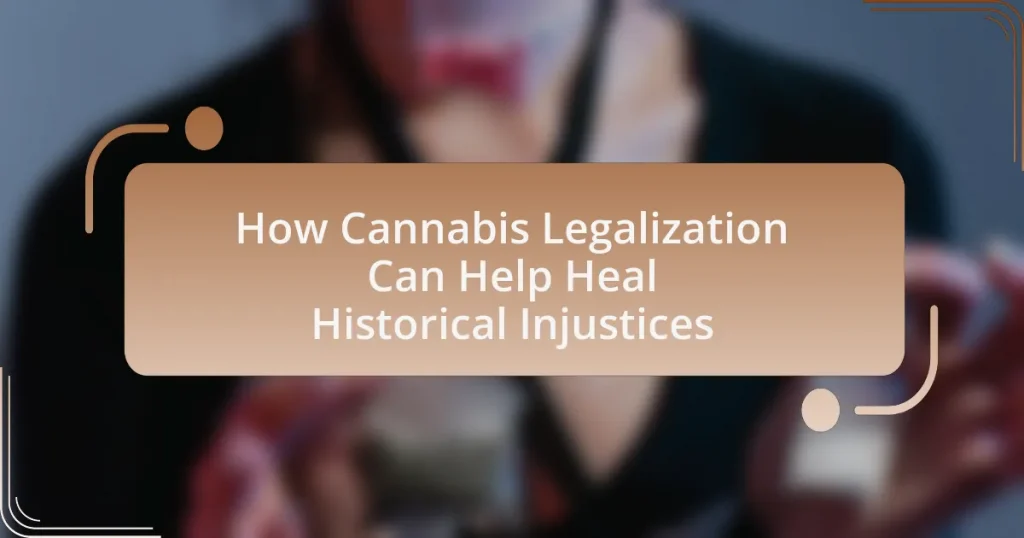Cannabis legalization has the potential to address historical injustices by rectifying the disproportionate impact of drug laws on marginalized communities, particularly Black and Latino populations. The article outlines how legalization can lead to the expungement of past cannabis-related convictions, thereby improving employment and housing opportunities for affected individuals. It also discusses the economic benefits of legalized cannabis, including increased tax revenues that can be reinvested into communities harmed by the War on Drugs. Furthermore, the article highlights the systemic racism associated with cannabis prohibition and the importance of implementing equitable policies to ensure that marginalized communities can participate in the legal cannabis market.

How Can Cannabis Legalization Address Historical Injustices?
Cannabis legalization can address historical injustices by rectifying the disproportionate impact of drug laws on marginalized communities. Historical data shows that, despite similar usage rates, Black individuals are nearly four times more likely to be arrested for cannabis-related offenses than white individuals. Legalization can lead to expungement of past convictions, thereby alleviating the long-term consequences of criminal records on employment and housing opportunities for those affected. Additionally, revenue generated from legalized cannabis can be reinvested into communities that have been disproportionately harmed by the War on Drugs, promoting economic development and social equity. Studies indicate that states with legalized cannabis have seen increased tax revenues, which can be allocated to social programs aimed at repairing the damage caused by previous enforcement practices.
What Historical Injustices Are Associated with Cannabis Prohibition?
Historical injustices associated with cannabis prohibition include systemic racism, criminalization of marginalized communities, and the disproportionate impact on Black and Latino populations. The Marihuana Tax Act of 1937 was rooted in racial prejudice, targeting Mexican immigrants and African Americans, leading to widespread arrests and incarceration. According to the American Civil Liberties Union (ACLU), Black individuals are nearly four times more likely to be arrested for cannabis possession than white individuals, despite similar usage rates. This enforcement disparity has resulted in long-lasting social and economic consequences for affected communities, including barriers to employment, housing, and education. Additionally, the War on Drugs, initiated in the 1980s, further exacerbated these injustices, leading to mass incarceration and the stigmatization of drug users, particularly among minority groups.
How has cannabis prohibition disproportionately affected marginalized communities?
Cannabis prohibition has disproportionately affected marginalized communities by leading to higher rates of arrest and incarceration among these groups. For instance, data from the American Civil Liberties Union (ACLU) indicates that Black individuals are nearly four times more likely to be arrested for cannabis possession than white individuals, despite similar usage rates. This systemic disparity has resulted in long-lasting social and economic consequences, including barriers to employment, housing, and education for those with criminal records related to cannabis offenses. Furthermore, the enforcement of cannabis laws has often targeted low-income neighborhoods, exacerbating existing inequalities and perpetuating cycles of poverty and disenfranchisement.
What are the long-term social and economic impacts of cannabis criminalization?
The long-term social and economic impacts of cannabis criminalization include increased incarceration rates, economic disparities, and persistent social stigma. Incarceration rates for cannabis-related offenses disproportionately affect marginalized communities, contributing to systemic inequalities; for instance, Black individuals are nearly four times more likely to be arrested for cannabis possession than white individuals, despite similar usage rates. Economically, criminalization restricts access to legitimate employment opportunities for those with criminal records, perpetuating cycles of poverty. Additionally, the prohibition of cannabis has resulted in lost tax revenue and economic growth potential; states that have legalized cannabis have generated billions in tax revenue, which could have been realized earlier if not for criminalization. These factors collectively illustrate how cannabis criminalization has lasting negative effects on both society and the economy.
How Does Cannabis Legalization Contribute to Social Justice?
Cannabis legalization contributes to social justice by addressing the disproportionate impact of drug enforcement on marginalized communities. Historical data shows that despite similar usage rates, Black and Latino individuals have been arrested for cannabis-related offenses at significantly higher rates than their white counterparts. For instance, a 2020 report from the American Civil Liberties Union indicated that Black individuals are 3.64 times more likely to be arrested for cannabis possession than white individuals, highlighting systemic racial disparities in law enforcement. Legalization not only reduces these arrests but also allows for the expungement of past convictions, thereby alleviating the long-term consequences of criminal records on employment, housing, and social mobility for affected individuals. Additionally, the legal cannabis industry can create economic opportunities in communities that have been historically disadvantaged, promoting equity and inclusion in a growing market.
What policies can be implemented to ensure equity in cannabis legalization?
Policies that can be implemented to ensure equity in cannabis legalization include establishing social equity programs, prioritizing licenses for individuals from communities disproportionately affected by cannabis prohibition, and creating funding mechanisms for minority-owned cannabis businesses. Social equity programs can provide training, financial assistance, and resources to help marginalized groups enter the cannabis industry, addressing historical injustices. For instance, states like Illinois have implemented such programs, resulting in increased participation from underrepresented communities. Additionally, prioritizing licenses for applicants with prior cannabis-related convictions can help rectify past harms, as evidenced by data showing that these communities have faced higher arrest rates. Funding mechanisms, such as grants or low-interest loans, can further support minority entrepreneurs, fostering a more inclusive market.
How can cannabis tax revenues be used to support affected communities?
Cannabis tax revenues can be used to support affected communities by funding social equity programs, education initiatives, and community development projects. These revenues can specifically be allocated to assist individuals and families impacted by past cannabis criminalization, providing resources for job training, legal aid, and mental health services. For example, in California, a portion of cannabis tax revenue is directed to the Cannabis Equity Program, which aims to help those disproportionately affected by the War on Drugs by offering grants and support for cannabis business ownership. This approach not only addresses historical injustices but also fosters economic growth within these communities.

What Are the Potential Benefits of Cannabis Legalization for Healing?
Cannabis legalization can provide significant benefits for healing by improving access to medical treatments and addressing historical injustices related to its prohibition. Legal access to cannabis allows patients suffering from chronic pain, anxiety, and other medical conditions to utilize cannabis as an alternative treatment, which studies have shown can be effective in reducing symptoms. For instance, a 2017 study published in the Journal of Pain found that patients using cannabis reported a 64% reduction in opioid use, highlighting its potential as a safer pain management option. Furthermore, legalization can rectify the social and economic disparities caused by past criminalization, particularly in marginalized communities disproportionately affected by drug laws. By allowing these communities to participate in the legal cannabis market, it can foster economic growth and provide opportunities for healing from the trauma of past injustices.
How Can Legalization Facilitate Expungement of Criminal Records?
Legalization of cannabis can facilitate the expungement of criminal records by providing a legal framework that allows individuals previously convicted of cannabis-related offenses to have their records cleared. This process is often included in legalization legislation, which recognizes that past convictions for activities now deemed legal are unjust. For instance, states like California and Illinois have enacted laws that automatically expunge records for individuals with prior cannabis convictions, reflecting a shift in societal attitudes and legal standards. This not only helps to rectify historical injustices but also enables affected individuals to access better employment, housing, and educational opportunities, thereby promoting social equity.
What processes are involved in expunging cannabis-related convictions?
The processes involved in expunging cannabis-related convictions typically include petitioning the court, reviewing eligibility, and obtaining a court order for expungement. Individuals seeking expungement must first determine if their conviction qualifies under state laws, which often require a waiting period and may exclude certain offenses. After confirming eligibility, the individual files a petition with the appropriate court, providing necessary documentation and evidence of rehabilitation. The court then reviews the petition, and if approved, issues an order to expunge the conviction from public records. This process is supported by various state laws aimed at addressing the injustices of past cannabis prohibition, reflecting a growing recognition of the need for restorative justice.
How does expungement impact individuals and communities?
Expungement positively impacts individuals and communities by removing criminal records associated with past cannabis offenses, thereby enhancing opportunities for employment, housing, and social reintegration. Individuals who have their records expunged experience reduced stigma and increased access to resources, which can lead to improved economic stability and mental health. Communities benefit from expungement as it fosters social equity, reduces recidivism rates, and promotes public safety by allowing formerly incarcerated individuals to contribute positively to society. Research indicates that states with expungement laws see a decrease in unemployment rates among affected populations, demonstrating the tangible benefits of such legal reforms.
What Role Does Education Play in Cannabis Legalization?
Education plays a crucial role in cannabis legalization by informing the public about the benefits and risks associated with cannabis use, thereby shaping public opinion and policy. Informed citizens are more likely to support legalization efforts, as education dispels myths and highlights the potential for economic benefits, such as tax revenue and job creation, seen in states like Colorado, which generated over $1.5 billion in cannabis tax revenue since legalization in 2014. Furthermore, educational initiatives can address historical injustices related to cannabis prohibition, such as the disproportionate impact on marginalized communities, by promoting awareness of these issues and advocating for equitable policies.
How can education programs mitigate the stigma surrounding cannabis use?
Education programs can mitigate the stigma surrounding cannabis use by providing accurate information about its effects, benefits, and legal status. These programs can educate the public on the medicinal properties of cannabis, highlighting research that shows its efficacy in treating conditions such as chronic pain and epilepsy. For instance, a study published in the Journal of Pain Research found that cannabis can significantly reduce chronic pain in patients, which counters negative perceptions. Additionally, education initiatives can address misconceptions and historical biases, fostering a more informed dialogue about cannabis use. By promoting understanding and awareness, these programs can help shift societal attitudes and reduce stigma associated with cannabis consumption.
What information should be included in educational campaigns about cannabis?
Educational campaigns about cannabis should include information on its legal status, health effects, responsible use, and the historical context of cannabis prohibition. The legal status of cannabis varies by region, and understanding local laws is crucial for compliance and safety. Health effects should cover both potential benefits, such as pain relief and anxiety reduction, and risks, including addiction and mental health issues. Responsible use guidelines are essential to promote safe consumption practices. Additionally, campaigns should address the historical injustices related to cannabis prohibition, highlighting how these laws disproportionately affected marginalized communities and the ongoing efforts to rectify these injustices through legalization and expungement of criminal records. This comprehensive approach ensures that individuals are informed about cannabis in a factual and contextually relevant manner.

What Challenges Remain in the Path to Cannabis Legalization?
Challenges that remain in the path to cannabis legalization include federal regulatory inconsistencies, social equity concerns, and ongoing stigma. Federal laws classify cannabis as a Schedule I substance, creating conflicts with state laws that have legalized it, which complicates banking and taxation for cannabis businesses. Additionally, there are significant social equity issues, as communities disproportionately affected by past cannabis prohibition often lack access to the legal cannabis market. According to a 2021 report by the American Civil Liberties Union, Black individuals are nearly four times more likely to be arrested for cannabis-related offenses than white individuals, highlighting the need for equitable policies. Lastly, societal stigma surrounding cannabis use persists, influencing public opinion and legislative action against legalization efforts.
What Legal Barriers Exist to Cannabis Legalization?
Legal barriers to cannabis legalization primarily include federal prohibition, conflicting state laws, and regulatory challenges. In the United States, cannabis remains classified as a Schedule I substance under the Controlled Substances Act, which creates significant legal obstacles for states attempting to legalize it. This federal status leads to complications such as limited access to banking services for cannabis businesses and restrictions on research funding. Additionally, states that have legalized cannabis often face conflicts with federal law enforcement, creating an uncertain legal environment. Furthermore, varying state regulations can complicate interstate commerce and create disparities in enforcement and access, hindering the overall legalization process.
How do federal laws conflict with state-level legalization efforts?
Federal laws conflict with state-level legalization efforts primarily because cannabis remains classified as a Schedule I substance under the Controlled Substances Act, which prohibits its use, distribution, and possession. This federal classification creates a legal discrepancy where states that have legalized cannabis for medical or recreational use are operating in violation of federal law. For instance, despite states like California and Colorado legalizing cannabis, federal authorities can still enforce laws against cannabis-related activities, leading to potential legal actions against businesses and individuals operating within state-sanctioned frameworks. This conflict complicates banking, taxation, and regulatory compliance for cannabis businesses, as federal regulations hinder access to financial services and protections that other legal industries enjoy.
What are the implications of cannabis being classified as a Schedule I substance?
Cannabis being classified as a Schedule I substance implies that it is considered to have a high potential for abuse, no accepted medical use, and a lack of accepted safety for use under medical supervision. This classification restricts research opportunities, as researchers face significant regulatory hurdles and limited access to cannabis for scientific studies, which hinders the understanding of its medical benefits. Additionally, the Schedule I status perpetuates stigma and criminalization, disproportionately affecting marginalized communities, as evidenced by the fact that individuals from these communities are more likely to be arrested for cannabis-related offenses despite similar usage rates across demographics. This classification thus not only limits scientific inquiry but also exacerbates social injustices, highlighting the need for reform in cannabis policy to address these historical inequities.
How Can Advocacy Groups Support Cannabis Legalization Efforts?
Advocacy groups can support cannabis legalization efforts by mobilizing public opinion, influencing policymakers, and providing education on the benefits of legalization. These organizations often conduct campaigns that raise awareness about the social and economic advantages of cannabis legalization, such as reducing incarceration rates and generating tax revenue. For instance, a report from the Drug Policy Alliance highlights that states with legalized cannabis have seen significant tax revenue increases, which can be reinvested into communities disproportionately affected by past drug policies. Additionally, advocacy groups can facilitate community engagement by organizing events and forums that allow citizens to voice their support, thereby creating a grassroots movement that pressures legislators to act.
What strategies can advocacy groups employ to promote legalization?
Advocacy groups can employ strategies such as grassroots mobilization, public education campaigns, coalition building, and lobbying to promote legalization. Grassroots mobilization involves organizing community members to participate in rallies and events, which can increase visibility and demonstrate public support. Public education campaigns aim to inform the public and policymakers about the benefits of legalization, including economic advantages and social justice implications, as evidenced by studies showing reduced incarceration rates in states that have legalized cannabis. Coalition building with other organizations can amplify voices and resources, creating a united front that enhances credibility and influence. Lobbying efforts directed at legislators can lead to the introduction of bills and amendments that favor legalization, supported by data from states where legalization has resulted in increased tax revenue and job creation.
How can community engagement enhance the push for cannabis reform?
Community engagement can enhance the push for cannabis reform by fostering grassroots advocacy and amplifying diverse voices in the legislative process. Engaged communities can mobilize public support, educate stakeholders about the benefits of reform, and share personal stories that highlight the injustices caused by cannabis prohibition. For instance, a study by the Drug Policy Alliance found that community-led campaigns significantly increased public awareness and support for cannabis legalization, demonstrating that local involvement can effectively influence policymakers. Additionally, when communities participate in discussions about cannabis reform, they can ensure that the policies developed address historical injustices, such as the disproportionate impact of drug laws on marginalized populations.
What Practical Steps Can Individuals Take to Support Cannabis Legalization?
Individuals can support cannabis legalization by actively engaging in advocacy efforts, such as contacting legislators to express support for legalization bills. This direct communication can influence policymakers, as demonstrated by a 2021 survey indicating that 68% of Americans support cannabis legalization, showing a significant public backing that legislators consider. Additionally, individuals can participate in local advocacy groups or organizations that promote cannabis reform, which can amplify their voices and efforts. Volunteering for campaigns or initiatives that aim to educate the public about the benefits of legalization, including its potential to address historical injustices related to drug enforcement, further strengthens the movement. Engaging in community discussions and sharing factual information about cannabis can also help shift public perception and reduce stigma, contributing to a more favorable environment for legalization efforts.
How can individuals get involved in local cannabis advocacy efforts?
Individuals can get involved in local cannabis advocacy efforts by joining or forming community organizations focused on cannabis reform. These organizations often engage in educational campaigns, lobbying for policy changes, and organizing events to raise awareness about the benefits of cannabis legalization. For instance, groups like the National Organization for the Reform of Marijuana Laws (NORML) provide resources and support for local chapters, enabling individuals to participate in advocacy initiatives effectively. Engaging in public forums, attending city council meetings, and collaborating with local leaders can further amplify their impact in promoting cannabis legalization and addressing historical injustices associated with cannabis prohibition.
What resources are available for those looking to educate themselves on cannabis issues?
Numerous resources are available for individuals seeking to educate themselves on cannabis issues, including academic journals, government publications, and nonprofit organizations. Academic journals such as the Journal of Cannabis Research provide peer-reviewed studies on various aspects of cannabis, while government publications from agencies like the National Institute on Drug Abuse offer data and insights on cannabis use and its effects. Nonprofit organizations, such as the Marijuana Policy Project, provide educational materials and advocacy resources focused on cannabis legalization and its social implications. These resources collectively contribute to a comprehensive understanding of cannabis issues, particularly in the context of historical injustices related to its prohibition.


